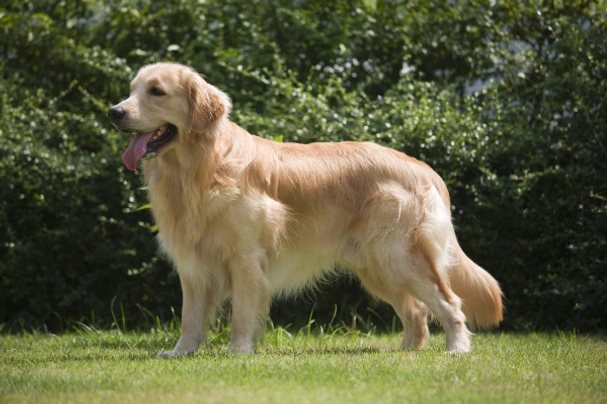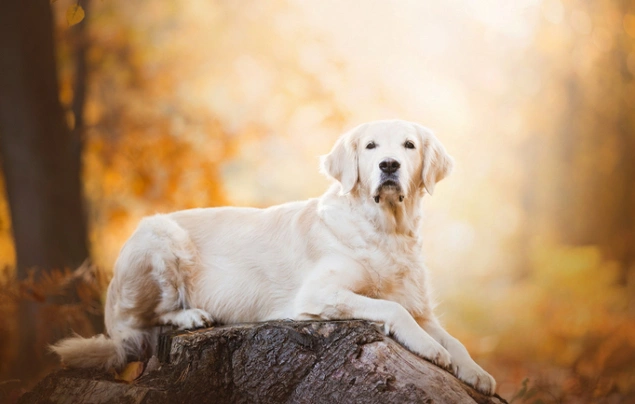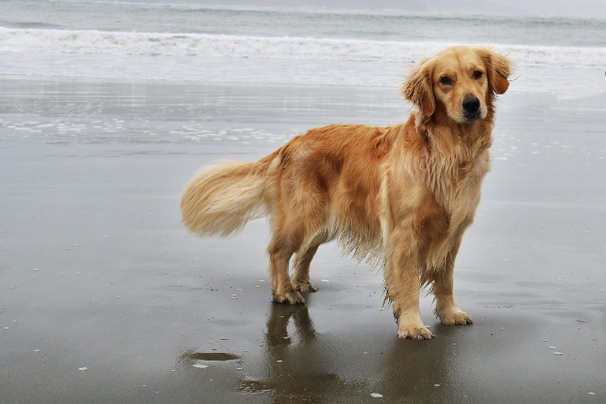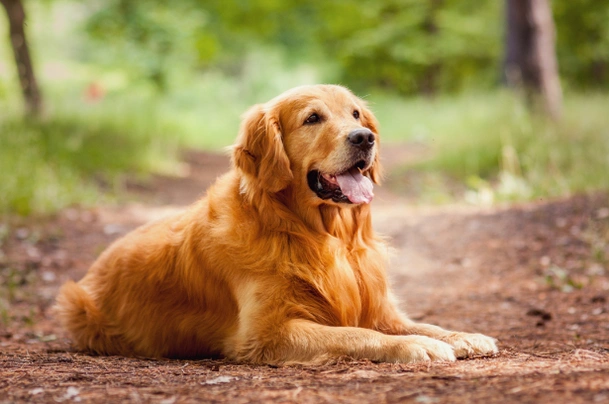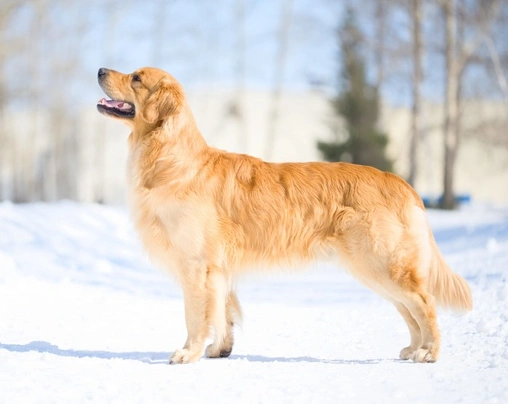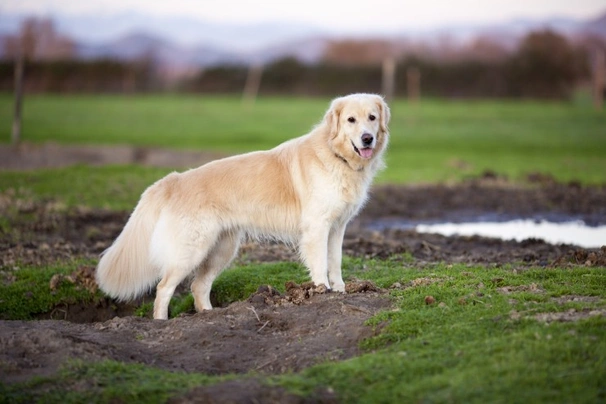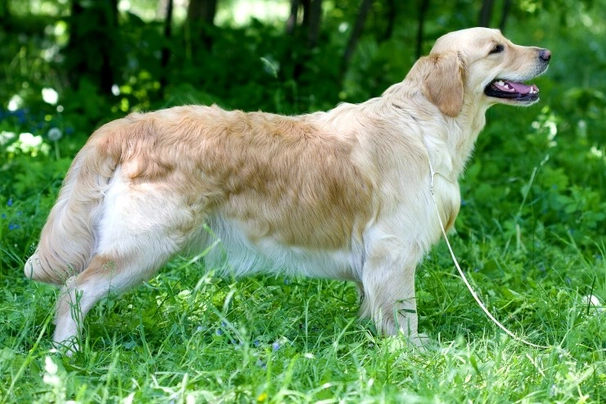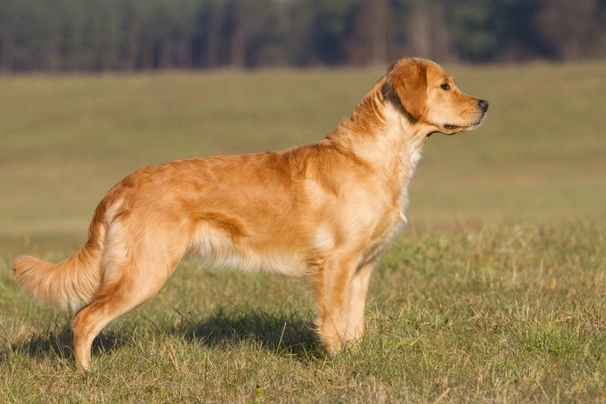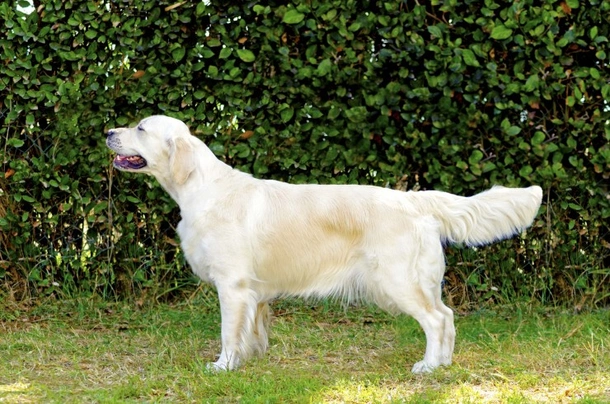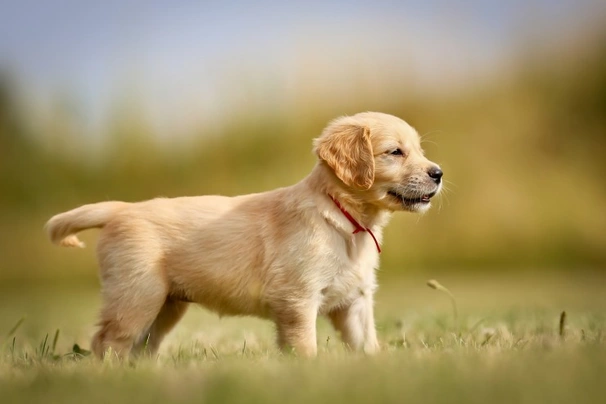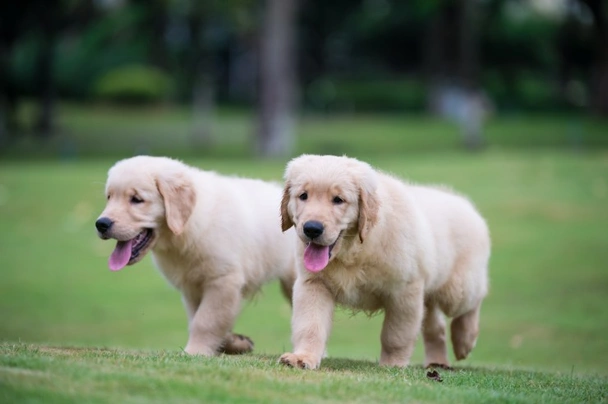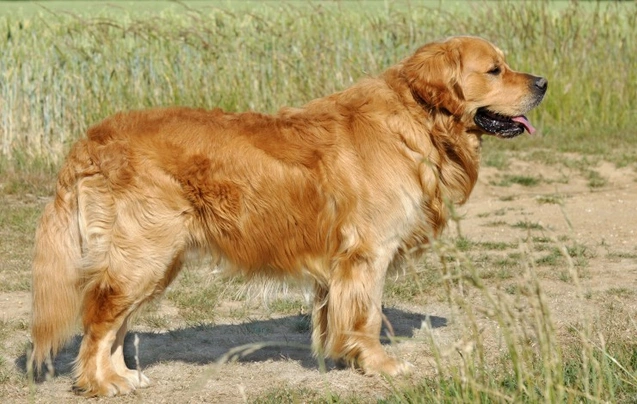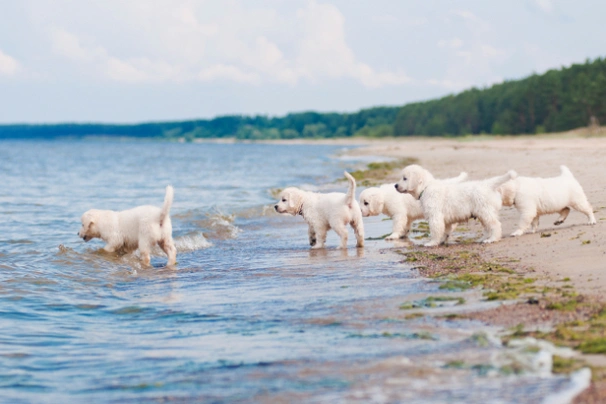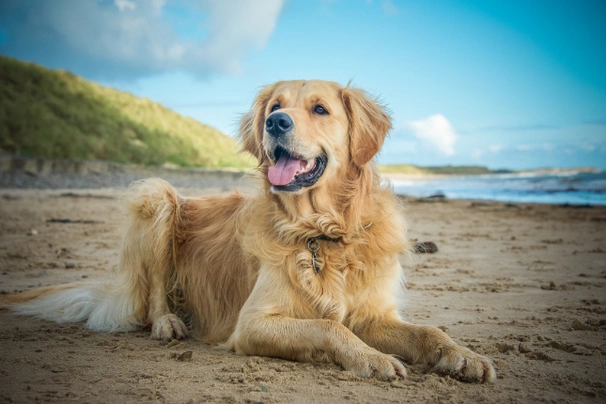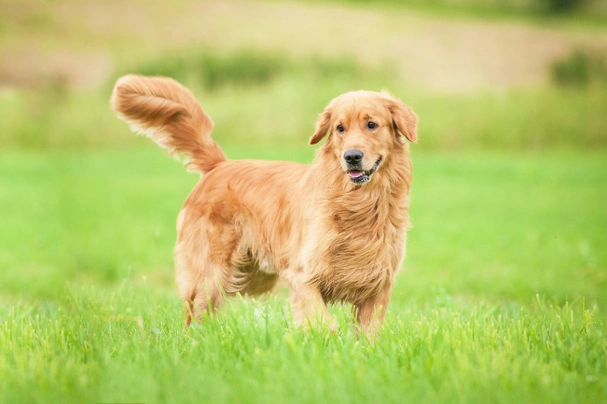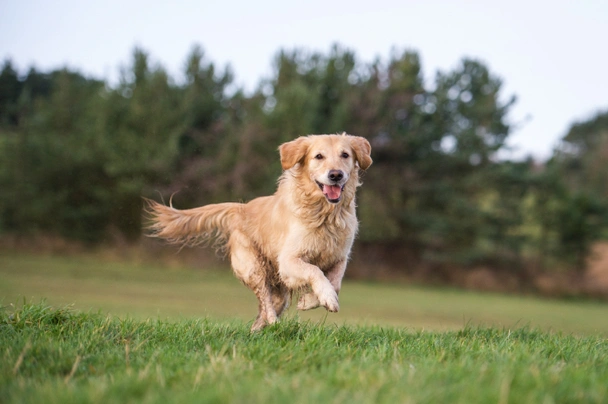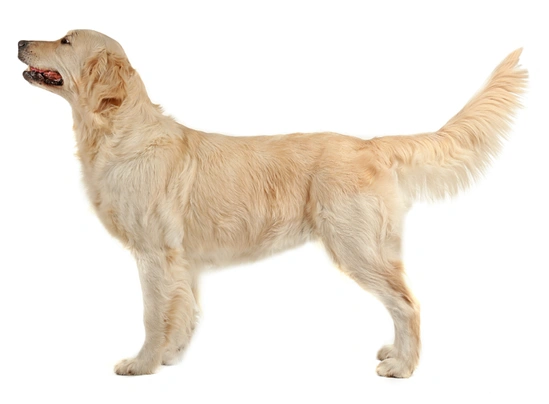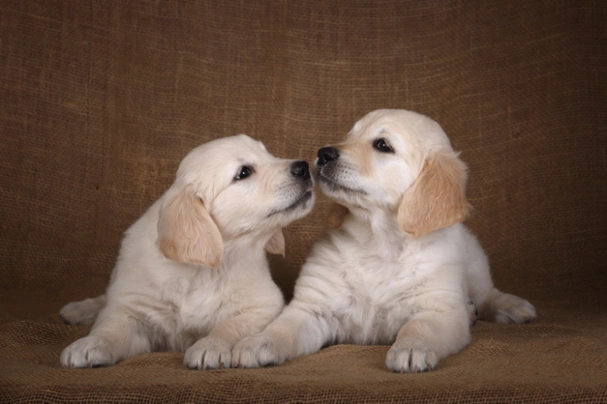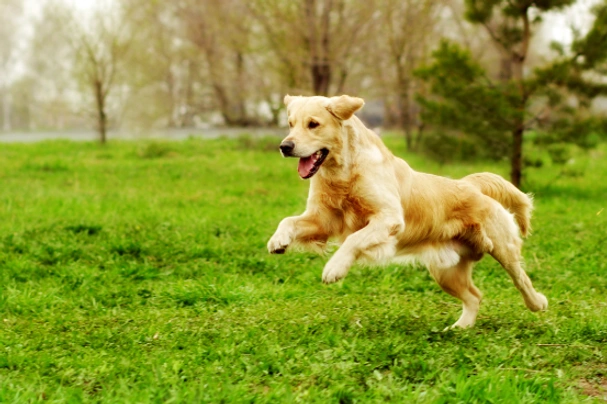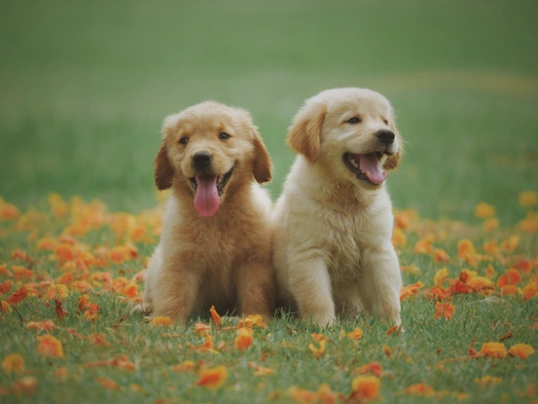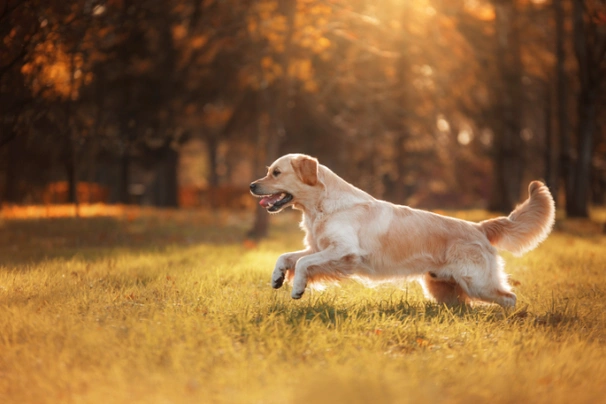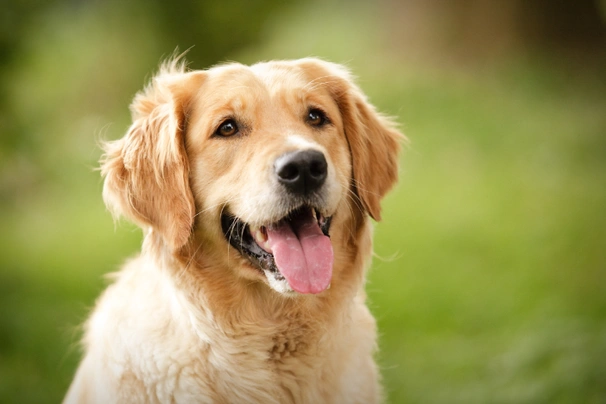Golden Retriever
Pros
Cons
Introduction of the Golden Retriever
Golden Retrievers have consistently remained one of the most popular choices of pets here in the UK and the world over for many years and for good reason. These dogs boast wonderfully calm natures which paired to their intelligence and trainability make them the perfect choice as family pets. Originally bred to retrieve "game" many Golden Retrievers are still seen in the "field" because they are so highly valued for their working skills.
However it's in the home and workplace that Golden Retrievers really shine they are marvelous with children and other pets. They are renowned for being one of the best breeds used a guide dogs. They excel at other jobs they are asked to do which includes detecting bombs tracking and competing in obedience classes. They are one of the top choices of dogs used in search and rescue situations. They boast loyal and affectionate natures whether they are working dogs or family pets thanks to their loyal and trustworthy personalities.
History of the Golden Retriever
For a long time the breed's origin was a little confusing but today most enthusiasts believe these lovely "golden" dogs came about all thanks to Lord Tweedmouth who set about producing a gundog capable of retrieving game from water and marshlands. Yellow Retrievers already existed as working dogs in the field but it was the Lord's endeavours that produced the Golden Retrievers we see today.
There is some thought that the ancestors of Golden Retrievers were first seen when they performed in a Russian Circus and that it was Lord Tweedmouth who first saw them when the circus was in town in Brighton during the mid-1800's. The dogs the Lord watched perform had wavy thick coats and they stood at around 30-inches at the withers. Their coats ranged from a cream to light biscuit in colour and the Lord liked the look of them so much he purchased the dogs which he then took to his estate in Scotland where he used his dogs to track down deer and other game.
Later in the early 1950's the Lord's great nephew the 6th Earl of Ilchester claimed that these dogs did not originate from a Russian circus and provided a stud book that had been kept since 1835 proving these dogs had been used on the estate since that date and that the first "yellow" dog had been purchased in Brighton in 1864 from a cobbler. The puppy was one of a litter produced by black wavy-coated Retrievers and was called "Nous".
The first time Golden Retrievers were ever shown at the Crystal Palace was in 1908 by Viscount Harcourt and then a year or so later at Crufts. He started the "Culham" line using dogs bred by the Earl of Portsmouth. The dogs that were exhibited were referred to as "Flat Coat (Golden)" a name they retained right up till 1913 only being called Golden Retrievers in 1920 but they were officially recognised as a breed by the Kennel Club in 1903.
Interesting facts about the breed
- Is the Golden Retriever a vulnerable breed? No they have consistently been one of the most popular breeds in the UK and elsewhere in the world
- There is a story that Golden Retrievers were originally used as performing dogs in the Russian circus although there is no actual proof of this
- Golden Retrievers adore swimming and like nothing more than to take the plunge whenever they can
- They are one of the best therapy dogs in the world
- Golden Retrievers have a tremendous sense of smell and are known to be brilliant tracking dogs
- They are one of the smartest dogs on the planet
- Their double coats are extremely water-repellent
Appearance of the Golden Retriever
Height at the withers: Males 56 - 61 cm Females 51 - 56 cm
Average Weight: Males 29 - 34 kg Females 25 - 29 kg
Golden Retrievers are well-balanced powerful looking dogs that boast an intelligent and ultra-kind expression. Their heads are well proportioned in relation to their bodies. They have strong muzzles which are deep and wide with a black nose. Their eyes are deep set and dark brown in colour with black rims and they are set well apart. Their ears are medium in size which dogs hold level to their eyes giving them the kind and intelligent expression the breed is so well known for.
A Golden Retriever's mouth is strong boasting a perfect bite yet Golden Retrievers are very soft mouthed. They have strong muscular necks and nicely formed forequarters with shoulders well laid back. A Golden Retriever's body is well-balanced and nicely proportioned boasting a deep well sprung ribcage and nicely level sleek topline. Hindquarters are strong and muscular with powerful back legs and feet that are very cat-like in appearance.
When it comes to their coat Golden Retrievers have either a wavy or flat extremely water-resistant double coat with a good amount of feathering. The accepted Kennel Club breed colours are as follows:
- Cream
- Gold
- Golden
Gait/movement
When a Golden Retriever moves they do so with tremendous drive and power always being true and straight both in their forequarters and their hindquarters. Every stride is free-moving with dogs covering a lot of ground.
Faults
The Kennel Club frowns on any exaggerations or departures from the breed standard and would judge a fault on how much it affects a dog’s overall health and wellbeing as well as their ability to perform.
Male Golden Retriever should have both testicles fully descended into their scrotums and it's worth noting that a Golden Retriever could be a little taller or shorter and slightly heavier or lighter than stated in the Kennel Club breed standard which is given as a guide only.
Temperament of the Golden Retriever
To describe a Golden Retriever in a nutshell these dogs are confident by nature as well as being extremely kind and affectionate which is why they have become one of the top choices of family pets the world over having been at the top of the list when it comes to popularity both in a home and working environment. They are not known to be the best watch dogs simply because they are too kind and rarely would a Golden Retriever show any sort of aggression towards people or other animals.
Known to be highly intelligent Golden Retrievers are easy to train and they love working and being given "jobs" to do whether in a home environment as working dogs or out in the field. However they are more relaxed than Border Collies and are quite happy to chill out too. Their kind natures and even temperaments shine through no matter where they are or what they are trained/asked to do.
Are they a good choice for first time owners?
Golden Retrievers are a great choice for first time owners because they are so biddable and easy going by nature which makes them easy to train. However they hate being left on their own for long periods which means owners need to have enough time to dedicate to their canine companions for them to be truly happy in a home environment.
What about prey drive?
Golden Retrievers are confident laid-back dogs by nature and although they are extremely good working dogs in the field they do not have a high prey drive preferring to get on with other animals and pets they meet.
What about playfulness?
Golden Retrievers remain very puppy-like well into their senior years and thoroughly enjoy playing interactive games. Being so intelligent they learn new tricks extremely quickly which is why they are so good at many canine sports including agility which is an activity they are known to excel at and which they thoroughly enjoy.
What about separation anxiety?
Golden Retrievers are known to suffer from depression if they are left on their own for too long which is why they are better suited to households where one person stays at home when everyone else is out so they never spend a lot of time on their own.
What about adaptability?
The Golden Retriever is a highly adaptable dog and therefore they fit in to most people's lifestyles. With this said they need enough space to express themselves as they should which means they are better suited to living in houses rather than apartments. There is nothing a Golden Retriever enjoys more than being able to romp around in a secure back garden whenever they can so they can really let off steam.
What about excessive barking?
Golden Retrievers are not "barkers" however any dog that's left to their own devices for long periods of time would show their distress by barking. Because Goldens are known to suffer from separation anxiety when they are left unattended for more than a few hours not only would they suffer from depression but they may start barking incessantly to get someone's attention. It would be their way of showing how unhappy they are about the situation.
Do Golden Retrievers like water?
Golden Retrievers have a real affinity with water and will jump in whenever they can and they are strong swimmers. Their double coats offer them a tremendous amount of protection because they are so water repellent. Anyone who shares a home with one of these lovely dogs should always take great care when walking their pets off the lead anywhere near more dangerous watercourses just in case they decide to leap in.
Are Golden Retrievers good watchdogs?
A Golden Retriever would always tell their owners when strangers are about but thanks to their kind and friendly natures they are not the best watchdogs. Anyone looking for a more impressive watchdog would do better to choose another breed.
Intelligence / Trainability of the Golden Retriever
Golden Retrievers are extremely intelligent dogs which is paired to the fact they are always keen and eager to please. This makes them ultra-easy to train which is one of the reasons why Goldens excel at so many things including fieldwork. When correctly handled and trained these dogs excel at so many different disciplines and they are frequently used as assistant dogs for the disabled. However Golden Retrievers are sensitive by nature and therefore do not respond well to any sort of harsher training methods or correction. They do respond to positive reinforcement and will be more accommodating and sensitive to this type of guidance and direction.
Golden Retrievers are one of the top breeds to take part in Field Trials. Working Tests Obedience Working Trials Agility Heelwork to Music and Breed Shows all of which they excel at. They are also used as Dogs for the Disabled Hearing Dogs Guide Dogs and Therapy PAT dogs thanks to their intelligence and kind placid natures.
It's all too easy to spoil a Golden Retriever puppy because they are so adorably cute. But their education must start as soon as they arrive in their new home with the first commands they are taught being as follows:
- Come
- Sit
- Stay
- Quiet
- Leave it
- Down
- Bed
Children and other
Like all other breeds when Golden Retrievers are socialised from a young age when they are puppies they embrace and adapt to all sorts of different lifestyles. The instinct to "nurture" is very strong in the breed which is a trait that has made them such popular family pets. They are extremely tolerant when around children of all ages. However dogs and children should always be supervised when they are together not because a dog might misbehave but rather because a toddler or younger child might get a little too boisterous around with their canine pet.
Golden Retrievers are also known to be very good around other pets and dogs rarely showing any aggressive behaviour towards them. However it's always a good idea to keep an eye on introductions to new dogs and pets to make sure everything stays calm and friendly although rarely would a Golden Retriever ever instigate a fight preferring to back away and keep their distance.
Health of the Golden Retriever
The average life expectancy of a Golden Retriever is anything between 10 - 12 years when properly cared for and fed an appropriate good quality diet to suit their ages.
In general Golden Retrievers are healthy and robust dogs but like so many other pure breeds they are known to develop and inherit a few genetic health issues which are worth knowing about if you are thinking about sharing your home with one of these lovely dogs. The health disorders the breed is prone to suffering from include the following:
- Hip dysplasia - tests available and all stud dogs should be hip scored
- Elbow dysplasia - tests available and all stud dogs should be tested clear before being used for breeding purposes
- Eye issues - incuded but not limited to Progressive Retinal Atrophy (PRA) Hereditary cataracts (HC) Multifocal Retinal Dysplasia (MRD) Post Polar Cataract (PPC) - annual tests available and all stud dogs should be tested clear before being used for breeding purposes
- Ectopic Ureter
More about Ectopic Ureter
Ectopic ureter is a condition that is also referred to a "wet puppy syndrome" and it is a hereditary disorder that affects Golden Retrievers although the exact way a puppy inherits the problem remains unknown. Tests have been carried out on Entlebucher Mountain Dogs which has established there are 3 ureteric subtypes namely A B and C. These are described below:
- A = Normal
- B = Intermediate
- C = Ectopic
Screening Entlebucher Mountain Dogs before they are used for breeding purposes has seen fewer cases of wet puppy syndrome in the breed over the last 4 years or so. As such Golden Retriever breed clubs in the UK are endeavouring to establish the same ultrasound screening test for the breed with the end goal being to establish if all 3 subtypes are present and to establish if dogs tested as being clinically normal exist in the breed with ectopic type C ureters and which could help identify how the disorder to transmitted. As such the Health Sub Committed of the Breed Council together with the Animal Health Trust have decided to start a project to develop a gene test for wet puppy syndrome in Golden Retrievers.
What about vaccinations?
All Golden Retriever puppies would have had their first vaccinations but it's essential for them to have their follow-up jabs at the right time with the vaccination schedule being as follows:
- 10 -12 weeks old bearing in mind that a puppy would not have full protection straight away but would be fully protected 2 weeks after they have had their second vaccination
There has been a lot of discussion about the need for dogs to have boosters. As such it's best to talk to a vet before making a final decision on whether a Golden Retrievers should continue to have annual vaccinations which are known as boosters.
What about spaying and neutering?
A male Golden Retrievers can safely be neutered when they are 6 months old and females can be spayed when they are 6 months old too.
What about obesity problems?
Some Golden Retrievers gain weight after they have been neutered or spayed and it's important to keep a close eye on their calorie intake and the amount of daily exercise they get to prevent obesity. An obese Golden Retriever would be put at risk of developing certain health issues which could end up shortening their lives by several years.
What about allergies?
Some Golden Retrievers are prone to developing allergies which can be triggered by several things and which often prove challenging to clear up. With Goldens and because they have such dense undercoats if they are not thoroughly dried off after being wet the moisture gets trapped and provides the perfect environment for an infection to flare up. However there are various things that can also trigger an allergy which includes the following:
- Environment
- A reaction to certain chemicals commonly found in household cleaning products
- Seasonal allergies which includes pollen and grasses
- Food which includes certain meats and cereals often used as ingredients in commercially produced dog food
- Tick and flea bites
- Dust mites
- Mould
Participating in health schemes
Unfortunately Golden Retrievers are predisposed to quite a few hereditary health issues but through careful testing and screening the Kennel Club together with the British Veterinary Association (BVA) the health of the breed has improved over the years. There are 3 health schemes available which all breeders are advised to use when breeding Golden Retrievers which reduces the risks of puppies being born with hereditary condition although it does not eliminate the risk altogether. The schemes available for the breed are as follows:
- BVA/KC eye scheme which covers Hereditary Cataract (HC) Progressive Retinal Atrophy (PRA) and Multifocal Retinal Dysplasia (MRD)
- It is worth noting that the number of Golden Retrievers with PRA has dropped significantly since the screening programme came into effect.
- It is also worth making a note of the fact there is a DNA test which is a simple cheek swab available for both GPRA-1 and GPRA-2 with kits being provided through the Animal Health Trust website.
- BVA/KC hip scheme - all breeders are advised to have their stud dogs hip scored and the lower a dog's score is the better with the results of tests being included in the Kennel Club registration papers of all puppies
- BVA/Elbow Scheme - all breeders are strongly advised to have stud dogs tested through the scheme which involves 3 X-rays being taken of each elbow. It is worth noting that some breeders believe the risks outweigh any benefits provided by testing a dog's elbows and that hip scoring and elbow testing tend to be done at the same time
- European Eye Scheme – some breeders use this test instead of the BVA/KC test on stud dogs. It includes Hereditary Cataracts Progressive Retinal Atrophy and Multifocal Retinal Dysplasia and all dogs need to be tested on an annual basis. However the Kennel Club does not recognise the scheme and therefore test results would not be included in a puppy's registration papers
What about breed specific breeding restrictions?
Currently there are no breed specific breeding restrictions in place for the Golden Retriever.
What about Assured Breeder requirements?
It is mandatory for all Kennel Club Assured Breeders to have stud dogs tested using the following schemes and all other breeders are advised to do the same to ensure good breeding practices:
The Kennel Club also strongly advises all breeders to use the following schemes on any dogs they plan to use for breeding purposes:
- BVA/KC Elbow Dysplasia Scheme
- Females under 18 months must not produce a litter
- Females must not produce more than one litter every 12 months
Other tests that are available for Golden Retrievers which all breeders should use are as follows:
- Progressive Retinal Atrophy (GR_PRA1)
- Progressive Retinal Atrophy (GR_PRA2)
- DNA test - ICT-A
Caring for the Golden Retriever
As with any other breed Golden Retrievers need to be groomed on a regular basis to make sure their coats and skin are kept in tip-top condition bearing in mind that they shed copious amounts of hair all year round and even more so in the Spring and Autumn. They also need to be given regular daily exercise to make sure they remain fit and healthy. On top of this they need to be fed a good quality well-balanced diet that meets all their nutritional requirements throughout their lives.
Caring for a Golden Retriever
As with any other breed Golden Retrievers need to be groomed on a regular basis to make sure their coats and skin are kept in top condition. They also need to be given regular daily exercise to ensure they remain fit and healthy. On top of this dogs need to be fed good quality food that meets all their nutritional needs throughout their lives.
Caring for a Golden Retriever puppy
Setting the home up ready for a puppy's arrival needs to be well in advance because it's important to keep them safe at a time when a puppy would be feeling very insecure. Puppy-proofing a home and garden takes a bit of planning and should involve making sure that anything that could end up injuring a small dog is well out of their reach. This includes electric wires and cables as well as garden tools and other implements that a boisterous puppy might decide to chew on or run into when playing outside.
It's also a good idea to set up a quiet area for a puppy to retreat to when they want to nap bearing in mind that puppies can sleep for up to 21 hours a day. They need to sleep to preserve their energy so they grow and develop as they should during the first months of their lives. The area should not be too out of the way because a puppy needs to know someone is around and it's important to keep an eye and ear on them just in case they get themselves into trouble.
Golden Retrievers are intelligent and learn things quickly which generally means they are easy to house train but there are bound to be a few accidents along the way. It's never a good idea to tell a puppy off when they get it wrong but rather to keep an eye out for when they need to go to the toilet and either take them outside to do their business or put them on a puppy training pad as quickly and as gently as possible giving them lots of praise when they do their "business" in the right place.
A Golden Retriever puppy would have been wormed before being sold and the documentation a breeder provides for a puppy must have all the details of their worming date and the product used as well as the information relating to their microchip. It is essential for puppies to be wormed again keeping to a schedule which is as follows:
- Puppies should be wormed at 6 months old
- They need to be wormed again when they are 8 months old
- Puppies should be wormed when they are 10 months old
- They need to be wormed when they are 12 months old
Things you'll need for your puppy
There are items needed to care for a puppy which should be purchased well in advance of their arrival. The items needed include the following:
- Feed and water bowls making sure they are not too deep and ideally they should be ceramic rather than plastic or metal
- A good quality dog collar harness and lead
- A dog crate that's not too small or too big that a puppy would feel lost in it
- A well-made dog bed bearing in mind that a puppy could well chew on it
- Baby and/or dog blankets to use in the puppy's crate and dog bed
- Dog specific toothpaste and tooth brush
- Good quality toys and chews for puppies to play with and gnaw on
- Shampoo and conditioner specifically formulated for use on dogs
- Grooming equipment
Keeping the noise down
All puppies are very sensitive to loud noises so it is important to keep the volume of a television down and not to play music too loudly either because it could frighten a Golden Retriever puppy and prevent them from napping as they should during the day.
Keeping vet appointments
Reputable breeders would always ensure their puppies vaccinated before they are sold but as previously mentioned it is up to their new owners to make sure they are given their follow-up shots at the right time which should be as follows:
- 10 -12 weeks old bearing in mind that a puppy would not have full protection straight away but would only be fully protected 2 weeks after they have had their second vaccination
When it comes to boosters it's best to discuss these with a vet because there is a lot of debate about whether a dog really needs them after a certain time. However if a dog ever needed to go into kennels their vaccinations would need to be
What about Golden Retrievers when they reach their golden years?
When Golden Retrievers reach their golden years they do slow down in many ways and they might start showing their age with more grey hairs appearing on their faces and more especially around their muzzles. Apart from a change in their appearance a Golden Retriever's personality might change too and this includes on how quick they are to respond to a command or when their names are called. The reason for this is that many older dog's hearing is not as good as it once was. Other changes to watch out for in a Golden Retriever when they reach their senior years include the following:
- Their vision might be impaired and their eyes seem cloudy
- Their teeth might not be as in good condition which means they may need dental work
- Older dogs tend to sleep more during the day and they get up more frequently at night which is often because their cognitive function is not as sharp as it was when they were young which means older dogs are more easily confused
- They tend to be less tolerant of loud noises and sounds
- Dogs when they are older can be a little fussier about their food so it's important to rethink their diet and to make sure they are getting all the nutrients they need to stay healthy
- An older dog's immune system often does not offer them the same protection against illness and infection which puts them more at risk of catching something and why they should see the vet more routinely
- An older Golden Retriever might not be so keen to go out for a walk and more especially longer ones
- They muscle tone and body condition is not as good as when they were young
- Older dogs often suffer from joint problems which can then lead to arthritis so it's well worth investing in a comfy dog bed and ideally one that a finds easier to get out of
Grooming of the Golden Retriever
Golden Retrievers boast having luxurious coats and as such they do shed copiously. It's best to start teaching puppies that a grooming session is an enjoyable experience because these lovely dogs will need a lot in the way of brushing throughout their lives. A daily brush is essential not only to keep a Golden Retriever's coat and skin in good condition but to keep on top of any shed hair too.
It's also a good idea to keep a Golden Retriever's feet nicely trimmed paying special attention to the hair that grows between their toes and paw pads. This prevents any of the hair "balling up" with mud or ice which can make walking very uncomfortable for a dog. It's also important to keep a close eye on a Golden Retriever's ears and to make sure they are kept nice and dry to reduce the risk of any infections setting in which can be notoriously hard to clear up once they take hold.
Golden Retrievers also benefit from being professionally groomed from time to time so their coats can be hand stripped which makes caring for them that much easier. When it comes to bathing Golden Retrievers are drawn to water like magnets it's in their DNA so occasionally they will get muddy and dirty especially when the weather is wet. This means a dog might need a bath but it's important not to overdo it and to always use a dog specific shampoo to avoid upsetting the natural pH balance of a dog's skin which could result in them developing a skin irritation or allergy.
Grooming tools needed for an Golden Retriever
Having the right grooming tools helps keep a Golden Retriever's coat and skin in top condition. The tools needed to keep a dog's coat looking good are as follows:
- A grooming glove
- Double-sided thinning scissors
- A slicker brush
- A bristle brush
- A fine toothed comb
- Nail clippers
- A pair of round ended scissors
- Dog specific shampoo and conditioner
Exercise of the Golden Retriever
Golden Retrievers are active lively dogs and they need to be given lots of regular exercise to remain fit and healthy. However initially puppies should only be allowed to play in the garden but they also need to be introduced to as many new people other animals and situations as possible during the first few weeks and months of their lives. Once they have had all their shots they can be taken out for short walks with 15 minutes being ample to keep them happy and fit.
Older dogs need to be given a good 2 hours exercise every day and this needs to include lots of mental stimulation in the form of interactive games. Golden Retrievers are highly intelligent and need to be kept busy both physically and mentally to be truly happy well-rounded dogs. With this said once back home these dogs are quite happy to chill out and relax with their owners liking nothing better than to curl up on the couch with them.
When they reach their golden years Golden Retrievers slow down just like any other breed and although they might be a little slower off the mark they still need to be given regular daily exercise only walks need to be shorter and less of a distance covered so they don't get too tired out. They also still need to be given lots of mental stimulation because it helps keep their cognitive ability sharp which is extremely important when a dog reaches their senior years.
Feeding of the Golden Retriever
Golden Retrievers are not finicky or fussy eaters in fact quite the opposite is true. These dogs like their food a little too much and are prone to put on too much weight if fed an incorrect amount of food on a daily basis and not given enough exercise to burn off any excess calories.
If you are getting a puppy the breeder would let you know what type of food they have been on and would recommend you feed a new puppy the same diet otherwise they might get a tummy upset all due to a change in their diet. You can change the sort of food you feed a puppy slowly over a period of a few weeks to avoid this from happening. It's important to feed a puppy food that has been specifically formulated for them because it contains all the right nutrients they need to develop and grow properly.
Older Golden Retrievers need to be fed a good quality well balanced diet to suit their ages being careful not to overfeed a dog or give them too many treats as rewards for being good. When training a Golden Retriever it's best to use healthy low calorie treats and to limit the amount you give a dog to prevent them putting on too much weight.
Dogs and puppies that carry too many extra pounds are more at risk of developing serious health disorders. It puts far too much pressure on their joints and internal organs including their hearts. In short an overweight or obese Golden Retriever might not live as long as a fit and healthy dog because carrying too much weight can drastically reduce a dog’s life span.
Feeding guide for a Golden Retriever puppy
Once a puppy is settled into their new homes it is safe to change their diets but as previously touched upon it needs to be done gradually and carefully to avoid any tummy upsets. As a rough guide Golden Retriever puppies can be fed the following amounts every day to ensure they are getting all the nutrients they need to grow and develop properly:
- 2 months old - 211g to 237g depending on a puppy's build
- 3 months old - 262g to 308g depending on a puppy's build
- 4 months old - 283g to 339g depending on a puppy's build
- 6 months old - 323g to 445g depending on a puppy's build
- 8 months old - 299g to 418g depending on a puppy's build
- 10 months old - 286g to 411g depending on a puppy's build
- 12 months old - 287g to 401g depending on a puppy's build
- 14 months old - 285g to 394g depending on a puppy's build
Feeding guide for a Golden Retriever
As a rough guide an adult fully grown Golden Retriever can be fed the following amounts every day to ensure they stay fit and healthy:
- 400 - 560g good quality highly nutritious food a day depending on a dog's activity
Golden Retriever price
If you are looking to buy a Golden Retriever you would need to pay anything from £500 to up to £1000 and over for a well-bred pedigree puppy. The cost of insuring a male 3-year old Golden Retriever in the north of England would be £22.00 a month for basic cover but this rises to £42.92 a month for a lifetime policy (quote as of August 2017). It's important to bear in mind that insurance companies factor in many things when calculating a premium and this includes where you live in the UK and a dog's age and breed.
When it comes to food costs you would need to buy the best quality food whether wet or dry to feed your dog throughout their lives and it has to suit the different stages of their lives too. For a Golden Retriever this would set you back between £40-£50 per month. On top of this you would need to factor in veterinary costs if you want to share your home with a Retriever and this includes their initial vaccinations the cost of neutering or spaying your dog when the time is right and then their annual health check visits all of which can quickly add up to over a £1000 a year.
As a rough guide the average cost of keeping and caring for a Golden Retriever would be in the region of £100 to £120 a month depending on the level or insurance cover you opt to buy for your dog but this does not include the initial cost of buying a well-bred pedigree Golden Retriever puppy.
Buying advice
When visiting and buying any puppy or dog there are many important things to consider and questions to ask of the breeder/seller. You can read our generic puppy/dog advice here which includes making sure you see the puppy with its mother and to verify that the dog has been wormed and microchipped.
The Golden Retriever is an extremely popular breed both in the UK and elsewhere in the world which means that well-bred puppies command a lot of money. As such with the Golden Retriever there is specific advice questions and protocols to follow when buying a puppy which are as follows:
- Beware of online scams and how to avoid them. You may see online and other adverts by scammers showing images of beautiful Golden Retrieverpuppies for sale at very low prices. However the sellers ask buyers for money up front before agreeing to deliver a puppy to a new home. Potential buyers should never buy a puppy unseen and should never pay a deposit or any other money online to a seller. You should always visit the pet at the sellers home to confirm they are genuine and make a note of their address.
- As previously touched upon the Golden Retriever is among the most popular breeds in the UK. As such there are many amateur breeders/people who breed from a Golden Retriever far too often so they can make a quick profit without caring for the welfare of the puppies their dam or the breed in general. Under Kennel Club rules a dam can only produce 4 litters and she must be between a certain age to do so. Anyone wishing to buy a Golden Retriever puppy should think very carefully about who they purchase their puppy from and should always ask to see the relevant paperwork pertaining to a puppy's lineage their vaccinations and their microchipping

READY NOW Quality Golden Retriever puppies
£1,000
White KCReg Golden Retriever pups DNAclearparents
£2,325
